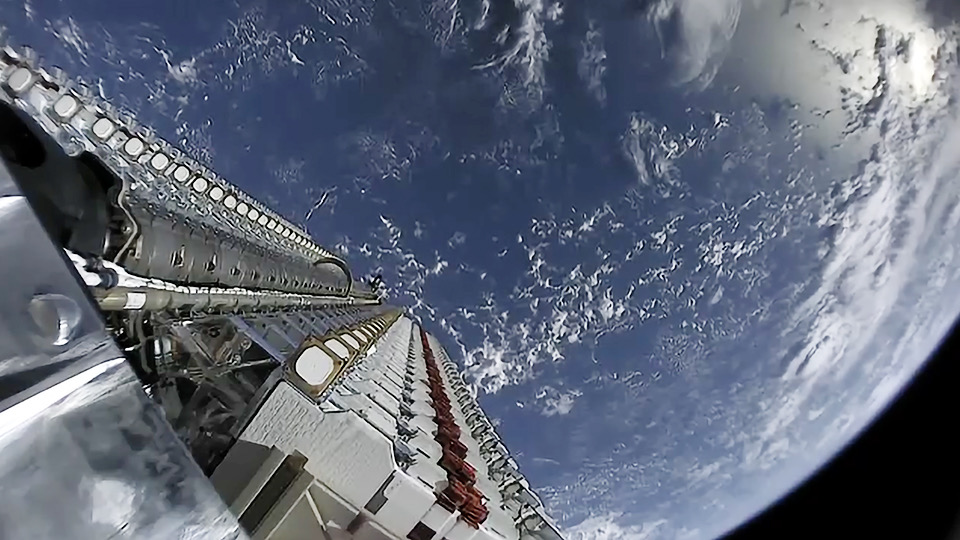Elon Musk says SpaceX focusing on cyber defense after Starlink signals jammed near Ukraine conflict areas
Starship and Starlink V2 progress will be delayed, Musk said.

SpaceX founder and CEO Elon Musk said Friday that his company is now focusing on cyber defense and overcoming signal jamming of its Starlink internet satellites amid Russia's ongoing invasion of Ukraine.
Musk and SpaceX sent Starlink terminals to Ukraine at the request of a government official after internet service was disrupted across the country by the Russian invasion. A shipment of Starlink ground terminals, which use an antenna and terminal to access the satellite broadband service, arrived in Ukraine by Monday Feb. 28). With the terminals in use, SpaceX is working to keep them online, Musk said.
"Some Starlink terminals near conflict areas were being jammed for several hours at a time," Musk wrote in a Twitter statement Friday (March 1). "Our latest software update bypasses the jamming."
Related: How will Ukraine keep SpaceX's Starlink internet service online?
Photos: Russia's invasion of Ukraine as seen in satellite images
SpaceX reprioritized to cyber defense & overcoming signal jamming. Will cause slight delays in Starship & Starlink V2.March 5, 2022
Musk later said SpaceX is shifting its focus to keeping its Starlink service uninterrupted in Ukraine and likely elsewhere.
"SpaceX reprioritized to cyber defense & overcoming signal jamming," he wrote Friday. Musk quipped that the measures were a bit of unexpected quality assurance work for the Starlink system.
Musk also said the Starlink work "will cause slight delays in Starship & Starlink V2."
Breaking space news, the latest updates on rocket launches, skywatching events and more!
SpaceX's Starship is a giant reusable spacecraft designed to use a huge reusable booster called Super Heavy to launch missions into deep space. NASA has tapped the Starship vehicle to land astronauts on the moon for its Artemis program. SpaceX is hoping the launch the first orbital flight of an uncrewed Starship in the next few months. Starlink V2 is SpaceX's next-generation Starlink system that includes laser links between satellites and other enhancements.
Important warning: Starlink is the only non-Russian communications system still working in some parts of Ukraine, so probability of being targeted is high. Please use with caution.March 3, 2022
After delivering Starlink terminals to Ukraine, Musk cautioned that the system could make its users vulnerable to Russian military attacks.
"Important warning: Starlink is the only non-Russian communications system still working in some parts of Ukraine, so probability of being targeted is high. Please use with caution," Musk wrote on Twitter Thursday (March 3).
"Turn on Starlink only when needed and place antenna away as far away from people as possible," Musk continued. "Place light camouflage over antenna to avoid visual detection," he added.
On Thursday (March 3), SpaceX sent its latest batch of Starlink satellites into orbit on a Falcon 9 rocket. That mission launched 47 new Starlink satellites in orbit from Pad 39A at NASA's Kennedy Space Center. To date, SpaceX has launched more than 2,000 satellites into orbit, with plans for an initial megaconstellation of 12,000 to provide global broadband coverage.
Email Tariq Malik at tmalik@space.com or follow him @tariqjmalik. Follow us @Spacedotcom, Facebook and Instagram.

Tariq is the award-winning Editor-in-Chief of Space.com and joined the team in 2001. He covers human spaceflight, as well as skywatching and entertainment. He became Space.com's Editor-in-Chief in 2019. Before joining Space.com, Tariq was a staff reporter for The Los Angeles Times covering education and city beats in La Habra, Fullerton and Huntington Beach. He's a recipient of the 2022 Harry Kolcum Award for excellence in space reporting and the 2025 Space Pioneer Award from the National Space Society. He is an Eagle Scout and Space Camp alum with journalism degrees from the USC and NYU. You can find Tariq at Space.com and as the co-host to the This Week In Space podcast on the TWiT network. To see his latest project, you can follow Tariq on Twitter @tariqjmalik.
